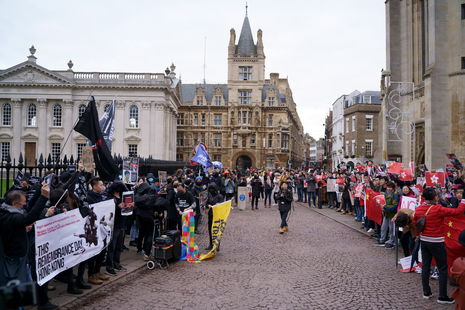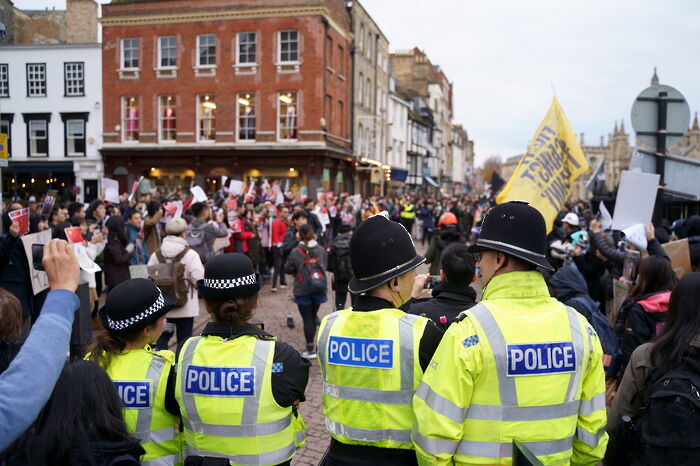Hong Kong tensions prompt questions over the University’s links to China
As political frictions between China and Hong Kong have escalated in recent weeks, Varsity explores how Cambridge’s links in the region impact students

Beijing’s proposed security bill to ban ‘treason, secession, sedition and subversion’ has sparked international debate. The law is perceived to threaten Hong Kong’s independent ‘executive, legislative and judicial power’, which was enshrined in the territories Basic Law since its handover in 1997.
Wang Yi, China’s foreign minister, claimed there was a ‘pressing obligation’ to enact the law, while Chinese Security Minister John Lee described the law as an effort to combat “terrorism”.
The resolution was passed by China’s National People’s Congress on the 28th of May.
Varsity spoke to students from Hong Kong and China to discuss their thoughts on the situation and how the ongoing tensions have impacted their life on campus.
Regarding Chief Executive Carrie Lam’s continued Wolfson College Honorary Fellowship, a student from Hong Kong stated that it is not “right or proper for us to honour an alumna who is an accomplice to such disrespect of academic freedom”. Another asserted that “when it comes to human rights abuse, especially when it is enforced by an honorary fellow of a college, the University should not turn a blind eye”.
Last November, pro-democracy campaigners, including students at the University, protested against Wolfson College’s decision to retain Lam as an Honorary Fellow.
Counter-demonstrations also gathered in support of the police and against the months of unrest in Hong Kong.
Lam has previously come under fire for claiming that education in Hong Kong could not be left unattended and would be “handled by gatekeepers”.
In an email to Wolfson students in December 2019, College President Professor Jane Clarke responded to requests for Lam’s Fellowship to be withdrawn. Clarke told students that though College Fellows felt that civil unrest in Hong Kong posed “a real threat to the values of respect, trust and mutual understanding which we espouse in the College”, the College Governing Body decided against taking any action.
Cambridge’s links to China were highlighted when concerns about academic freedom were raised following censorship at Cambridge University Press (CUP). At the request of Beijing, CUP blocked hundreds of “politically sensitive” articles from its Chinese website, including those on the 1989 Tiananmen Square protests and Hong Kong’s democracy movement.
CUP reinstated the articles after an international protest by academics.
In light of this, one Hong Kong student questioned “whether the University is still upholding its core values of freedom of thought and expression”.
Students also feared for the future of activism in Cambridge, highlighting the case of Queensland University student Drew Pavlou who is under disciplinary investigation for his pro-Hong Kong advocacy. One student from Hong Kong remarked they were “panicking” about the new security law, which will allegedly give authorities new legal grounds to monitor activist groups overseas.
Cambridge “must draw its red line on academic freedom”, the student argued.
“Chinese cash” was seen as the source of the danger to academic freedom at Cambridge. In 2012, the University faced scrutiny over donations from China, after it accepted a £3.7 million donation from the Chong Hua Foundation, which is linked to the Communist Party.
A Hong Kong student highlighted that “we need to be wary of the strings attached” to such “deals and collaborations”. They feared that “the financial plughole caused by the coronavirus pandemic would lead our university to sleepwalk into Chinese domination in exchange for some quick money”.
The University did not reply to Varsity’s request for comment on this matter.
In May, concerns were raised about the decision of the University’s Careers Service to circulate a recruitment programme from the Hong Kong Police Force (HKPF). The Careers Service told Varsity that “for the Service to have taken a unilateral decision to censor the opportunity would be problematic in itself”. This follows controversy about the Institute of Criminology’s ongoing MSt partnership with the HKPF.
Although some students expressed disappointment with the Careers Service for this decision, one Hong Kong student proposed that “the University does not have the right to censor job opportunities based on preconceived moral standards”.
Many students from Hong Kong stated that they felt obliged to avoid some spaces within the University, such as the Cambridge’s Chinese Students and Scholars Association (CSSA) and the Chinese Cultural Society (CCS).
The CSSA has been accused of helping the Chinese Government monitor its students abroad. According to one student from Hong Kong, the group allegedly allows authorities to “perform surveillance on their student population” and wield this as a “political weapon abroad”.
CSSA Cambridge did not respond to Varsity’s request for comment on these allegations.
Hong Kong students reported similar discomfort within certain college spaces: “Upon knowing the stance of some colleges, I would avoid applying for those”, one claimed.
Chinese students raised different perspectives.
One student, who participated in counter-demonstrations in support of the ‘One China’ policy in November 2019, proposed that the University “controls the situation well” and that “they should not support Hong Kong independence, as this violates the interest of both the Chinese and British government”.
Other students were more reticent. Many declined to comment.
 News / University Council rescinds University Centre membership20 February 2026
News / University Council rescinds University Centre membership20 February 2026 News / Hundreds of Cambridge academics demand vote on fate of vet course20 February 2026
News / Hundreds of Cambridge academics demand vote on fate of vet course20 February 2026 News / Judge Business School advisor resigns over Epstein and Andrew links18 February 2026
News / Judge Business School advisor resigns over Epstein and Andrew links18 February 2026 News / Union cancels event with Sri Lankan politician after Tamil societies express ‘profound outrage’20 February 2026
News / Union cancels event with Sri Lankan politician after Tamil societies express ‘profound outrage’20 February 2026 News / Caius students fail to pass Pride flag proposal20 February 2026
News / Caius students fail to pass Pride flag proposal20 February 2026










